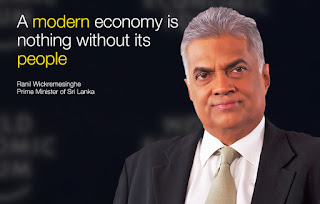Some of the new economic initiatives announced by the Sri Lankan government about integrating the economy with the wider world, initially acquiring land to create special
economic zones where large scale investment projects from India and
China are to be invited to locate, are a refreshing departure from an
economically dysfunctional post-independence mindset of nationalist
pre-conception of the national interest as a zero sum game with the
world beyond: their gain is our loss and our gain is their loss. Sri
Lanka at the time of independence boasted an economy more prosperous, a
population that was better educated and a society which was largely free
of the worst dysfunctional aspects of religion which characterize the
neighbouring countries of the sub-continent. Yet the country became
ensnared by angst over identity and suspicious of opening up the economy
to the world at a time when development was fueled by trade. The
changed mindset informing recent economic initiatives holds out
prospects for greater prosperity. Read more>>>
Monday 29 August 2016
Monday 22 August 2016
WAN Says Muslim Marriage And Divorce Act Treats Women As Second Class Citizens, Calls For Rectification
The Women Action Network (WAN) has called for the rectification of the Muslim Marriage and
Divorce Act (MMDA) of 1951 citing that the Act renders Muslim women as
second class citizens and does not guarantee them equal protection under
the law. The Network has also called on authorities to ensure that the
new Constitution rectifies this which will ensure Muslim women will have
equal rights in the eyes of the law. Read more>>>
Muslim Political & Religious Clerical Leadership Crisis in Sri Lanka
Who represent the Muslim community in the government? The shocking answer is “NONE”.
One may ask “how could the Muslims complain as there are several
Muslim ministers and deputy ministers in the government”. Yes there are
many Muslim ministers, but they do not represent the community as most
of them entered into deals and got into the government. For example the presence of Sri Lanka Muslim Congresses, SLMC, in the government is deceptive as they contested in UNP tickets and entered the government. Read more>>>
Monday 15 August 2016
The future of Sri Lanka’s economy
A new era has dawned in Sri Lanka. Peace has been consolidated
after a bloody 30-year civil conflict. The country’s 67-year old
democracy has been reinforced after a dramatic, peaceful and people-led
political transition in January 2015.We’re prioritizing business-friendly policies so that we can take advantage of today’s peace to build a thriving economy. Read more>>>
Tuesday 9 August 2016
Industrial Development Policy in the Islamic view point
Whilst the Western world has managed to achieve phenomenal development
since the industrial revolution the Muslim world on the other hand lags
far behind. The Muslim world is represented by an underdeveloped
infrastructure, poverty, unemployment and nothing in the way of
technological development. At the same time the Muslim world possesses
some of the worlds largest reserves of key mineral resources. The Muslim
world single handedly possesses 74% of the world’s oil reserves – the
world’s most important commodity. Read more>>>
The Manufacturing Policy and Building an Industrial State from the Viewpoint of Islam
Since the time Allah has created man and put him on earth, man tries to
satisfy his needs with materials created in the universe around him, as
well as trying to maintain his security, sovereignty and survival
whether in case of attack or defense by using the raw materials around
him. Read more>>>
Thursday 4 August 2016
World Islamic Economic Forum - 2016 in Indonesiya
The World Islamic Economic Forum started off from a modest beginning as
the OIC Business Forum, which was held on 15th October 2003, in
conjunction with the tenth OIC Summit in Putrajaya, Malaysia.The inaugural OIC Business Forum sought to create a business ‘face’ of
the OIC. The Forum brought together government leaders, captains of
industries, academic scholars, regional experts, professionals and
corporate managers to discuss opportunities for business partnerships in
the Muslim world. The second OIC Business Forum was convened in Kuala
Lumpur in 2004, a momentous event that brought about the birth of the
World Islamic Economic Forum and the subsequent convening of the 1st
WIEF in Kuala Lumpur in 2005. Read more>>>
Tuesday 2 August 2016
Muslim Women, Shariyah & Modernity
A Review of the book – Women Claiming Rights and
Spaces: Activism to Reform Muslim Personal Law in Sri Lanka, Published
by Muslim Women Research and Action Forum.
Muslim Personal Law (MPL) in Sri Lanka that governs the family
affairs of the Muslims which specifically includes marriage, divorce and
inheritance and exclusively applicable to the Muslims is supplementary
to the general law of the country. There are such supplementary family
laws like Kandyan Law and Thesavalamai Law that governs the family affairs of Kandyan Sinhalese and Jaffna Tamils respectively. Read more>>>
Subscribe to:
Posts (Atom)








